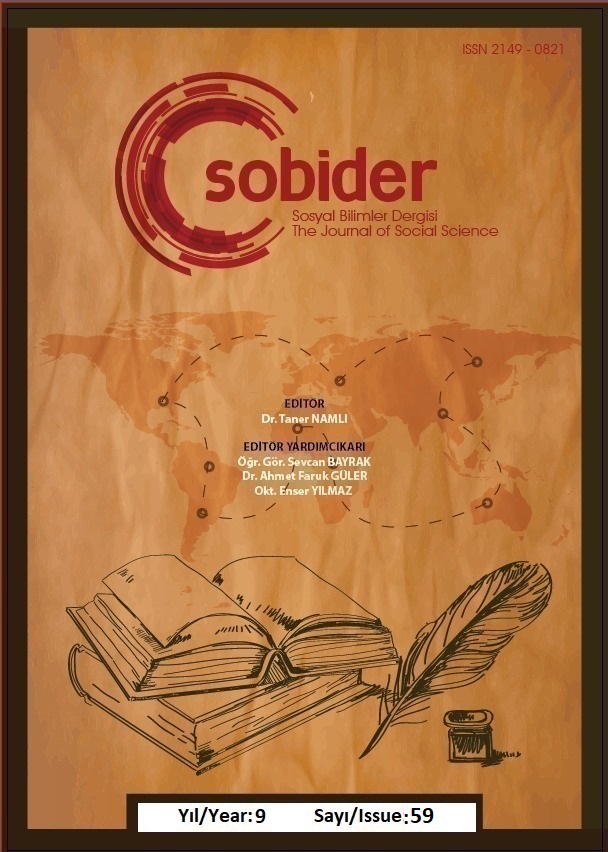KİŞİ BAŞINA DÜŞEN GAYRİSAFİ YURTİÇİ HÂSILA İLE MUTLULUK DÜZEYİ ARASINDAKİ İLİŞKİNİN İNCELENMESİ: TÜRKİYE ÖRNEĞİ
Author :
Abstract
Mutluluk, bireylerin yaşamlarından almış oldukları doyum ve olumlu geri dönüşlerin toplamı olarak ifade edilebilmektedir. Kişi başına düşen gayri safi yurtiçi hâsıla ise, gayrisafi yurtiçi hasılanın (GSYH) ülke nüfusuna oranlanmasıdır. Mutluluk kavramının iktisat ile ilişkisi 1974 yılında Easterlin’in yayınlamış olduğu çalışma ile başlamaktadır. Easterlin bu çalışmada ekonomik büyüme ile mutluluk arasındaki ilişkiyi incelemiş ve çalışma sonucunda literatüre Easterlin Paradoksu kazandırılmıştır. Türkiye’de mutluluk düzeyinin hesaplanması Türkiye İstatistik Kurumu (TÜİK) tarafından yapılmaktadır. Mutluluk düzeylerinin ilk kapsamlı ölçümü 2003 yılında yapılmıştır. Çalışmada, 2003-2020 yılları arasında satın alma gücü paritesine göre hesaplanan kişi başına düşen GSYH ve orta düzeyde mutlu bireylerin oranı değişken olarak kullanılmıştır. Değişkenler arasındaki ilişki dağılım grafiği yardımıyla incelenmiştir. Çalışma sonucunda satın alma gücüne göre hesaplanan kişi başına GSYH’de meydana gelen bir birimlik artışın bireylerin mutluluk düzeylerini 0,0002 birim artırdığı sonucuna ulaşılmıştır
Keywords
Abstract
Happiness can be expressed as the sum of the satisfaction and positive feedback that individuals receive from their lives. The gross domestic product per capita is the ratio of the gross domestic product to the population of the country. The relationship between happiness and economics begins with the study of Easterlin in 1974. Easterlin (1974) examined the relationship between happiness and economic growth, and as a result of the study, Easterlin Paradox was brought to the literature. The calculation of happiness in Turkey is made by the Turkish Statistical Institute (TURKSTAT). It had been made the first comprehensive measure of happiness in 2003. In study, the variables of gross domestic product per capita (GDP) and the ratio of moderately happy individuals calculated according to purchasing power parity between 2003 and 2020 were used. The relationship between the variables was examined with the help of the scatterplot. As a result of the study, it was concluded that a one-unit increase in the gross domestic product per capita calculated according to purchasing power increases the happiness levels of individuals by 0.0002 units.
Keywords
- Akgiş, Ö. (2015). “Bir Refah Göstergesi Olarak Türkiye’de Mutluluğun Mekansal Dağılışı.” Türk Coğrafya Dergisi, (65), s.69-76.
- Ball, R. ve Chernova, K. (2008). “Absolute Income, Relative Income and Happiness.” Soc Indic Res, (88), s. 497-529.
- Caner, A. (2015). “Happiness, Comparison Effects and Expectations in Turkey.” J Happiness Stud, (16), s. 1323-1345.
- Caporale, G. M.; Georgellis, Y.; Tsitsianis, N. ve Yin, Y. P. (2009). “Income and Happiness Across Europe: Do Reference Values Matter?” Journal of Economic Psychology, (30), s.42-51.
- Çılbant, C.; Ama Savaş, D. ve Yalçınkaya, M. H. (2018). “Bazı Ekonomik Göstergeler ve Mutluluk: Türkiye Üzerine Bir Değerlendirme.” Sosyoekonomik Boyutlarıyla İnovasyon içinde bölüm, Manisa Celal Bayar Üniversitesi Yayınları, s. 72-80.
- Çirkin, Z. (2015). “Gelir ve Mutluluk Arasındaki İlişkinin İncelenmesi.” Ankara Üniversitesi, Yüksek Lisans Tezi.
- Çirkin, Z. ve Göksel, T. (2016). “Mutluluk ve Gelir.” Ankara Üniversitesi Siyasal Bilgiler Fakültesi Dergisi, 71 (2), s. 375-400.
- Easterlin, R. A. ve Angelescu, L. (2009). “Happiness and Growth the World Over: Time Series Evidence on the Happiness-Income Paradox.” IZA Dıscussion Paper Series.
- Ferrer-i-Carbonell, A. (2005). “Income and Wwll-Being: An Emprical Analysis of The Comparison Income Effect.” Journal of Public Economics, (89), s.997-1019.
- Güzel, S. (2018). “Gelir Eşitsizliği, Refah ve Mutluluk.” Anemon Muş Alparslan Üniversitesi Sosyal Bilimler Dergisi, 6 (3), s. 389-394.
- Kabakçı Günay, E. ve Ata, O. (2018). “Gelir Mutluluk Getirir mi? Ülkelerin Gelir ve Mutluluk Düzeyleri Arasındaki İlişkiye Yönelik Bir Değerlendirme.” Kesit Akademi Dergisi, 4 (17), s. 161-192.
- Köksal, O. ve Şahin, F. (2015). “Gelir ve Mutluluk: Gelir Karşılaştırmasının Etkisi.” Sosyoekonomi, 23 (26), s. 45-59.
- Menteş, N. (2020). “Mutluluk, Gelir ve Demokrasi: Dünya Ülkeleri İçin Yapısal Eşitlik Modeli Önerisi.” İnsan ve Toplum Bilimleri Araştırma Dergisi, 9 (3), s. 2138-2153.
- Oishi, S.; Kesebir, S. ve Diener, E. (2011). “Income Inequality and Happiness.” Psychological Science, 22 (9), s. 1095-1100.
- Oishi, T.; Nozaki, K. ve Kobayashi, M. (2011). “Relative Income and Happiness in Asia: Evidence from Nationwide Surveys in China, Japan and Korea.” Soc Indic Res, (104), s. 351-367.
- Öztürk, S. ve Suluk, S. (2020). “Mutluluk Ekonomisi: G8 Ülkeleri Açısından Ekonomik Büyüme ve Mutluluk Arasındaki İlişkinin İncelenmesi.” Süleyman Demirel Üniversitesi Sosyal Bilimler Enstitüsü Dergisi, (37), s. 226-249.
- Peiro, A. (2006). “Happiness, Satisfaction and Socio-Economic Conditions: Some International Evidence.” The Journal of Socio-Economics, (35), s. 348-365.
- Ram, R. (2009). “Government Spending and Happiness of the Population: Additional Evidence from Large Cross-Country Samples.” Public Choice, 138 (3/4), s.483-490.
- Rojas, M: (2007). “Heterogeneity in The Relationship Between Income and Happiness: A Conceptual-Referent-Theory Explanation.” Journal of Economic Psychology, (28), s. 114.
- Sanfey, P. ve Teksoz, U. (2005). “Does Transition Make You Happy?” European Bank Working Paper, (91).
- Servet, O. (2017). “Mutluluğun Türkiye’deki Belirleyenlerinin Zaman İçinde Değişimi.” Akdeniz İİBF Dergisi, (35), s.16-42.
- Servet, O. (2018). “Dünya Ülkelerinde Mutluluk Eşitsizliği-Mutluluğu Belirleyen Faktörlerin Analizi.” Gaziantep Üniversitesi, Doktora Tezi.
- Şeker, M. (2011). “Mutluluk Ekonomisi.” İstanbul Journal Sociological Studies, (39), s. 115- 140.
- TDK (2021) https://sozluk.gov.tr/ (erişim tarihi: 04/08/2021)
- Terzibaş, P. (2020). “Mutluluk Ekonomisi ve Easterlin Paradoksunun Testi.” İstanbul Gelişim Üniversitesi, Yüksek Lisans Tezi.
- Tian, G. Ve Yang, L. (2006). “A Formal Economic Theory for Happiness Studies: A Solution to the Happiness-Income Puzzle.” https://www.semanticscholar.org/paper/A-FormalEconomic-Theory-for-Happiness-Studies%3A-A-%E2%81%84-TianYang/1bd190d5314a52077296e47cb6d9aa4cb0d0f6d8#paper-header (erişim tarihi: 25/07/2022)
- Yılmaz, E. (2018). “Davranışsal Ekonomide Gelir ve Mutluluk İlişkisi ve Bir Uygulama: Samsun İli Örneği, Karatay Üniversitesi, Yüksek Lisans Tezi.
- Yüksekbilgili, Z. ve Akduman, G. (2016). “Bireysel Mutluluk ve İşkoliklik İlişkisi.” Kocaeli Üniversitesi Sosyal Bilimler Dergisi, (31), s. 95-112.





